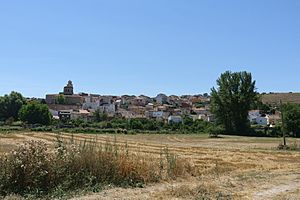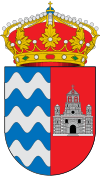Espinosa de Cerrato facts for kids
Quick facts for kids
Espinosa de Cerrato
|
|||
|---|---|---|---|
 |
|||
|
|||
| Country | |||
| Autonomous community | |||
| Province | |||
| Municipality | Espinosa de Cerrato | ||
| Area | |||
| • Total | 45 km2 (17 sq mi) | ||
| Population
(2018)
|
|||
| • Total | 149 | ||
| • Density | 3.31/km2 (8.58/sq mi) | ||
| Time zone | UTC+1 (CET) | ||
| • Summer (DST) | UTC+2 (CEST) | ||
Espinosa de Cerrato is a small town, also called a municipality, located in the province of Palencia in Castile and León, Spain. It's a part of a larger region in Spain. In 2018, about 149 people lived there. The town covers an area of 45 square kilometers.
Contents
A Look at Espinosa de Cerrato's Past
Espinosa de Cerrato has a long and interesting history. Long ago, in the Middle Ages, it was a village known for raising lots of cattle. This means people there focused on farming and taking care of animals like cows.
Early Ownership and Changes
Around the year 1170, a king named Alfonso VIII gave the village to a person named Pedro Martínez Ihobas. This was a thank you for Pedro's help in the military. Pedro then decided to give the village to a religious place called the Abbey of San Miguel de Treviño. An abbey is like a monastery where monks or nuns live and work.
Later, in 1323, this village, which was sometimes called Riofranco, was sold to another town named Palenzuela. By 1352, Espinosa de Cerrato was part of an area called Merindad del Cerrato. This area was under the control of Palenzuela.
Royal Connections and Lawsuits
In the mid-14th century, Espinosa de Cerrato became the property of the queen. This means it was directly owned by the royal family. Much later, in 1752, there was a big legal fight over who owned the village. The Duchess of Alba and the Count of Benavente both claimed it was theirs.
Religious Life in the Village
By 1785, Espinosa de Cerrato was known as an "abbatial village." This means it was still closely connected to an abbey or a church leader. This continued into the 19th century.
At that time, the village had a main church called Saint Martin. It also had two smaller chapels, known as hermitages, dedicated to Saint Roque and Saint Lucia. Hermitages are small places of worship. The village was part of the Diocese of Burgos for religious matters. A diocese is an area managed by a bishop. In 1955, it became part of the Diocese of Palencia instead.
Even in the 18th century, the town had six hermitages. These small churches helped meet the religious needs of the people as the community grew.
See also
 In Spanish: Espinosa de Cerrato para niños
In Spanish: Espinosa de Cerrato para niños
 | Calvin Brent |
 | Walter T. Bailey |
 | Martha Cassell Thompson |
 | Alberta Jeannette Cassell |



